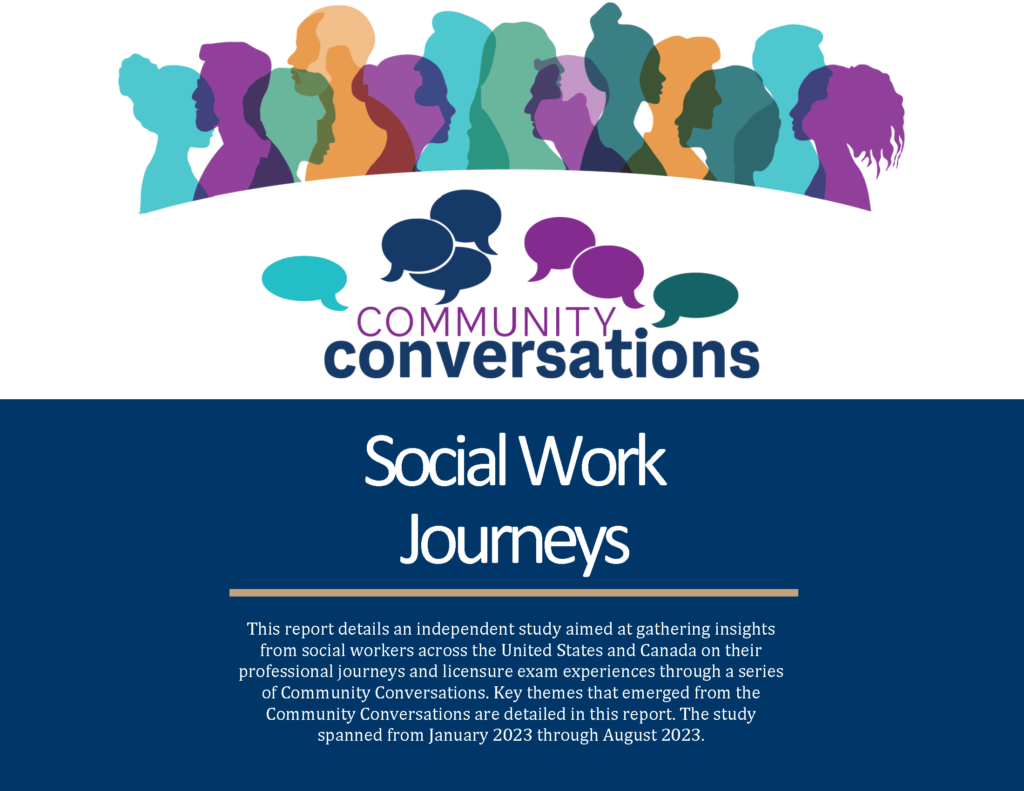Community Conversations: Social Work Journeys
As part of our ongoing efforts to listen to and learn from the social work community, we invited social workers to share their experiences with social work licensing and the licensing exams.
Read the Community Conversations report to learn more about the research findings.

Every facet of the social work community can do its part to effect change on society and our profession.
In August 2022, the Association of Social Work Boards published an analysis of pass rates on the social work licensing exams that shows differences in pass rates for different demographic groups. The data reflect a multitude of factors that can affect performance on a licensing exam, including educational background, preparation, and length of time between graduation and testing. The differences in pass rates also reflect societal opportunity gaps for historically underrepresented groups.
ASWB engaged HumRRO, an independent nonprofit research and consulting firm, to collaborate with community partners in facilitating inclusive and productive conversations about the social work licensing exams.
Stronger together
HumRRO also developed recommendations that seek to engage the entire social work community in the licensure process and help address the structural challenges facing candidates seeking licensure.
“Every facet of the social work community can do its part to effect change on society and our profession,” said ASWB CEO Stacey Hardy-Chandler, Ph.D., J.D., MSW, LCSW. “In our role as regulators, ASWB and its members are committed to profession-wide collaboration toward more informed and inclusive decisions about the future of the social work profession.”
About the community conversations
This series of facilitated conversations among social workers was designed to gather information to be used as we develop exams for the future of social work.
These conversations and the self-paced survey gave social workers the opportunity to share their unique experiences, engage in rich discussions with other social workers, and deepen their understanding of the different journeys of social workers. We provided a platform for offering feedback on the current licensing exams and identifying factors that contribute to exam outcomes. Each session centered around the test-taker experiences of exam preparation, administration, and outcomes.
The role of a community conversation participant was to share their lived experiences. Participants provided information about their careers, educational backgrounds, and current circumstances using journey maps to document the motivations, actions, feelings, and challenges they’ve experienced on the journey to becoming a licensed social worker.
Three CE credits were offered to participants.
Using the report’s findings
ASWB is using the Community Conversations research findings to inform the continued development of fair, reliable, and valid competence assessments and to determine future initiatives aimed at closing pass rate gaps among demographic groups.
“Many of the research findings, which come directly from social workers in the field across the United States and Canada, are being integrated into ASWB’s short- and long-term plans to continue our commitment to equity and justice,” said Senior Director of Examination Services Lavina Harless, MSW, LCSW. “We anticipated and are addressing many of the observations and recommendations that social workers shared.”
Initiatives already undertaken that align with the research findings include:
- Increasing the diversity of representation among exam question writers, Examination Committee members, and Practice Analysis Task Force members
- Providing education to the public about the item development process and the ways that ASWB guards against bias
- Developing new free resources for educators and making the ASWB Examination Guidebook for candidates available as a free download
- Committing to making the exams more accessible by offering a remote exam administration option to increase exam access in 2025
- Launching the Social Work Census in March 2024 to include as many voices as possible in the exam development process
Longer term initiatives include:
- Exploring changes to the exam structure such as implementing a module-based exam structure that would allow test-takers who are unsuccessful to retake only part of the exam
- Seeking options to reduce financial impact for repeat test-takers by developing a scholarship program
- Considering expanding competence assessments to include include question types other than multiple-choice with support from psychometricians at HumRRO

